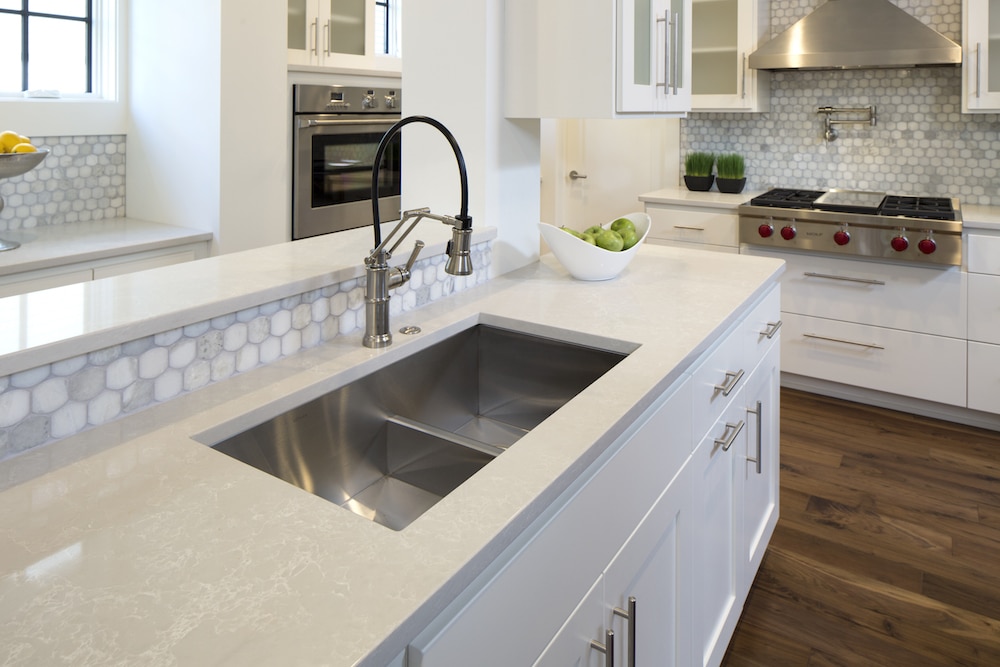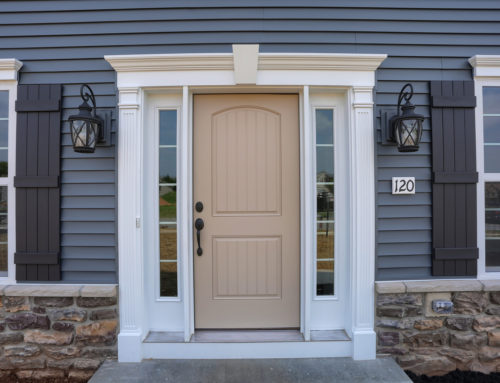Designing a house opens the doors to tons of options. Not only do you get to work with your home builder to customize the layout, but you have the chance to finally enjoy a kitchen that fits your lifestyle. In fact, picking out the countertops in a new home for your food preparation and eating areas might be one of the most enjoyable aspects of your building project.
You’ll discover that although there are plenty of choices for countertop materials, while Formica is often used, popular options include quartz and granite. Both materials offer their pros and cons, so it’s important to have a baseline understanding of each before you make your final selection.
All-Natural Granite
We’ll start with granite, a material made by the earth itself. Granite is a type of igneous rock, which means it was formed when magna from the core of the planet flowed upwards toward the surface and cooled. As you might imagine, because of its unique history, each slab of granite is completely distinctive. Some granite is light, other granite is dark, and you’ll find a plethora of granites that offer unusual color gradations and gorgeous veins.
From a purely geological standpoint, granite is supremely tough as far as plutonic rocks go. Not surprisingly, getting it out of the earth takes more than a few handheld chisels. Granite is pulled from quarries in huge blocks, which are then sliced – kind of like the bread the countertop in your new home will one day hold! – so they can be used in residences.
Engineered (Manmade) Quartz Countertops
“Wait… engineered? Isn’t quartz also natural?” you might ask. You’d be correct: quartz is a naturally occurring mineral. However, quartz countertops are composed of about 90-94 percent crushed quartz. The quartz is then mixed with resin, as well as other materials, to form slabs that can be conveniently turned into – you guessed it! – countertops for kitchens, baths, and many other places.
Like granite, quartz comes in a variety of colors that can be enhanced by adding pigments when the mixture is created. The result is superiorly durable and actually a bit harder on the Mohs scale than granite, although neither quartz nor granite countertops are indestructible.
Four Big Differences Between Granite and Quartz Countertops
At this point, you can see that granite and quartz countertops compare relatively favorably in terms of their origins, and their resulting uses. Both are excellently suited for new home kitchens, but are different in terms of maintenance, price, sustainability, and aesthetics.
1. Granite Versus Quartz: Maintenance Issues
If you’re someone who values a low-maintenance countertop, you may want to think twice about choosing granite. As polished and beautiful as it looks, it contains pores. And you can guess what that means: Places for bacteria to hide and breed.
In order to keep granite countertops absolutely sanitized, you must seal them about once a year. Sealing takes time, but helps you retain the attractiveness and healthiness of your countertops. Plus, the sealant will create a stain-resistant barrier, important if you happen to spill a dark liquid, such as tomato juice or red wine, onto the granite.
Quartz countertops come pre-sealed thanks to the resins and polymers used during their creation. They require no extra sealing at all, which is great if you’re looking for a countertop that will never need any TLC. However, there is one related downside to quartz countertops: If they are exposed to direct, unfiltered sunlight for long periods of time, they can discolor. Thus, they are inappropriate for many outdoor kitchen areas.
2. Granite Versus Quartz: Price
The second consideration for most homeowners is the price point of granite versus quartz. You’ll be happy to hear that the cost difference can be relatively small depending upon where you get your countertop. In fact, you may be able to get granite countertops for less per square foot than engineered quartz countertops; work with your home builder to discuss preferred vendors offering exceptional quality and prices.
An added price consideration is the cost of upkeep to granite countertops in terms of sealing them annually. Don’t forget, too, that you’ll pay for labor whether you go the granite or quartz route. Both weigh significant amounts; you always need professional labor to do a proper job installing granite or quartz countertops, although quartz is more flexible despite its sturdiness.
3. Granite Versus Quartz: Sustainability
Both types of countertops are cut to last for the long haul when treated with care, so they are sustainable in the sense that they will not break down, although you must be careful not to chip granite accidentally. Still, some people feel that granite has an environmental “leg up” over quartz because granite is a completely natural stone. Plus, many homeowners who want to build nature-inspired houses with solid wood floors and cabinets, as well as stone walls and floors, would never consider using any countertop material that wasn’t mined from the soil.
At the same time, quartz countertops – though they are made by human hands – do contain natural items. Additionally, quartz is abundant and not rare, which means it isn’t likely to run out anytime in the next millennium. Still, families may feel strongly one way or the other in terms of investing in sustainable home countertop solutions.
4. Granite Versus Quartz: Aesthetics
When most people picture a countertop, they have a specific aesthetic in mind. Maybe they want a perfectly smooth surface. Or perhaps they are interested in having a countertop with variations in color. Some might even like a more “sandy” texture.
Granite, while not textured, does provide tremendous variety. No granite slab is going to look like another; they’re basically the snowflakes of the countertop world! On the other hand, they can’t offer the granular symmetry and texturing of a manmade quartz countertop. And if you’re dead-set on a certain countertop hue, you might find it very difficult to find it in granite, although granite can sometimes be dyed.
Which Countertop Tops Them All?
From durable and economical Formica, to granite or quartz, what makes a better countertop? All are reasonable solutions if you’re ready to accept their pros and cons. At the end of the day, your ultimate selection should be based on a countertop material you’ll love from your morning sip of coffee to that indulgent midnight snack.











